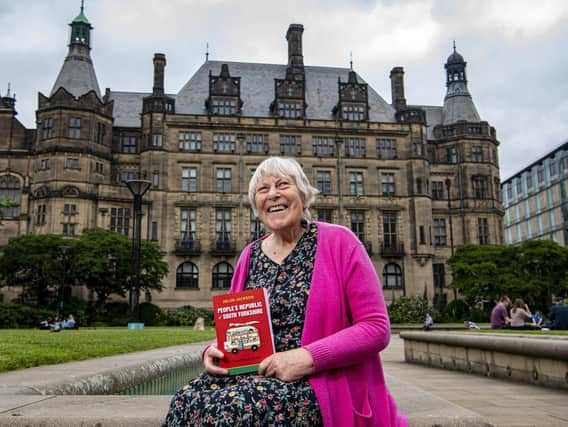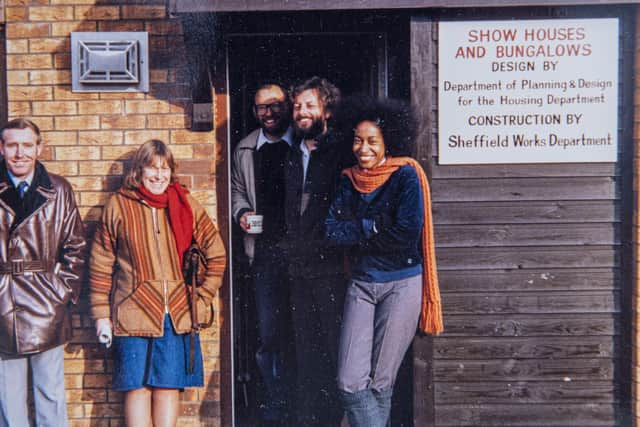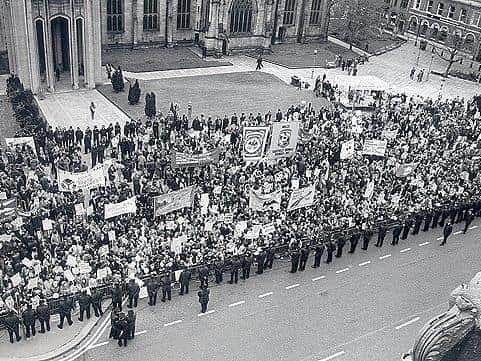Egg-throwing at Margaret Thatcher, 10p bus fares and battles with sexism - inside the 'People's Republic of South Yorkshire'


The ‘People’s Republic of South Yorkshire’ was a nickname used as much by detractors of the region’s left-wing administrations in the 1980s as their supporters but for Helen Jackson it is a phrase that provokes a simple feeling: pride. So much so that it is the title of the 82-year-old’s very first book.
Jackson was Labour MP for Sheffield Hillsborough for 13 years between 1992 and 2005 but her political memoir focuses on her formative years on Sheffield Council where she played a central role in the council’s left-wing administration led by a young David Blunkett and its bitter battles with Margaret Thatcher’s Government.
Advertisement
Hide AdAdvertisement
Hide AdMeeting at a cafe around the corner from Sheffield Town Hall, Jackson explains she wanted to give an insider’s account of a fascinating period of the city’s political history.


“I felt there was something a bit remarkable about the 1970s and early 1980s in Sheffield which was picked up in London and recognised a different way of economic development,” she says.
“I’m as proud of that as much of anything else I have done. What we were showing was how you could actually deliver a change and it actually worked.”
One of the most symbolic policies of that era were the subsidised bus fares that were introduced by the Labour-controlled South Yorkshire County Council in the 1970s which were set at a 10p flat rate for adults, 2p for children and free for pensioners. In her book, Jackson says the policy helped Sheffield become one of the least congested cities in the country and particularly helped women, many of whom at the time did not hold driving licences let alone own a car.
Advertisement
Hide AdAdvertisement
Hide Ad“It was a symbol of confidence and bloody mindedness because in all those early years we never had the backing of the Labour Cabinet,” says Jackson. “They constantly tried to persuade us to drop it. It was bloody popular and people still remember. It was South Yorkshire-wide and that is why it worked, it brought together that wider labour market in economic terms.”


The book is also a reflection on Jackson’s growing feminism as she frequently faced sexism as a woman in a male-dominated political environment.
She said the five-year process of writing the book had helped her reflect fully for the first time on “the degree to which I had changed and learnt and became different in my personality and particularly views”.
Jackson joined the Labour Party in 1962 after becoming involved in the Association for the Improvement of Maternity Services following a difficult birth.
Advertisement
Hide AdAdvertisement
Hide Ad"After I had my first child I was very disappointed by the way the hospital delivery was managed. I thought I suppose I had better join the Labour party so I did,” she explains.


After moving to Sheffield in 1974 with her husband and their three young children, she became involved in local Labour politics in addition to working as a teacher. The bus fares policy played a major part in Jackson’s move into frontline politics as she was asked to speak about its benefits at the Labour Party conference in 1978 at a time when the national leadership was opposed to it.
She recounted how the cheap bus fares enabled her to take her three children around South Yorkshire, helped young people learn independence and enabled pensioners to visit family members for free. She writes: “Long afterwards I realised that I had spoken with conviction, because I was using my experience as a woman with a family to win the argument. That had given me confidence. I have never forgotten how this one challenge made such a difference to me, a woman, away from her children for the first time doing something she had never done before.”
The experience gave her the confidence to stand for the council and she was elected to represent Owlerton in 1980. After little more than a year as a councillor, Blunkett asked Jackson to take over as chair of the Works Committee, a post in which she spent two years in the even more male-dominated environment of construction.
Advertisement
Hide AdAdvertisement
Hide AdIn the book, Jackson recounts how she “had to put older managers at their ease by asking about their families in a way they saw as normal conversation with a woman, before I could establish a useful discussion about the best way of achieving high productivity in a maintenance contract”.


She says today the experience ended up being a good grounding for her next post running the Employment Committee.
“It was in the early 1980s and it was the building trade. I always felt because people who had become managers through the craft system had never had at that level colleagues who were female to work with. They felt awkward. I don’t want to be negative about it because once they relaxed it was fine but you had to get to that situation before you could make proper contact. It was one of those little things you learn.
“It was a sharp learning curve in the Works Department. You become more self-aware and it becomes much easier to deal with. When we were dealing with people from the Chamber of Commerce and I was chair of economic development it wasn’t the same problem but you could tell it was still there.”
Advertisement
Hide AdAdvertisement
Hide AdThere was one woman Jackson had little time for – Margaret Thatcher. She was among the hundreds who protested against Thatcher when she came to give a speech to businessmen in the city in 1983 and had an egg thrown at her. “I was outside the Cutlers’ Hall, shouting. I never threw an egg, though – nearly did.”
The Miners’ Strike soon followed as Thatcher took on the trade unions and Jackson’s book is critical of Arthur Scargill’s leadership of the NUM. “Arthur Scargill’s rhetoric and character made it easier for Thatcher to treat the issue not as an industrial dispute within the energy sector but as a war,” she writes.
Jackson is initially reluctant to talk any further about Scargill but does say the experience of the time made her reassess some of her political opinions.
“There was something that grated - it was partly to do with the tone of voice and being so sort of shouty and cocky. I know exactly the same characteristics were being displayed by Margaret Thatcher at the same time. There were great similarities I think between Margaret Thatcher and Arthur Scargill. He wouldn’t like that but there were. They had to be in the forefront.”
Advertisement
Hide AdAdvertisement
Hide Ad